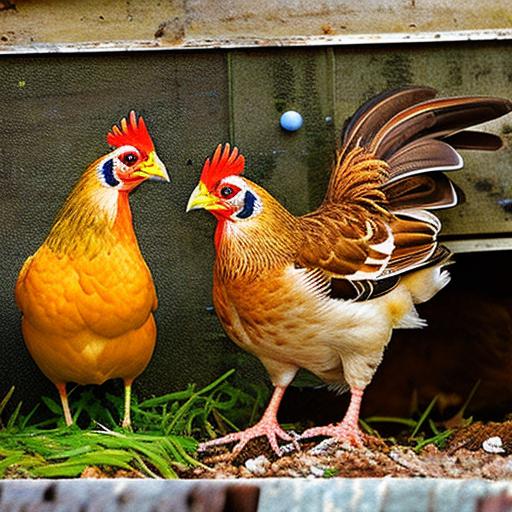Keeping chickens in residential areas has become a growing trend in recent years. More and more people are realizing the benefits of having their own flock of chickens, even in urban environments. Not only do chickens provide fresh eggs, but they also offer natural pest control and can be a fun and educational hobby. However, before diving into the world of backyard chickens, it is important to understand the local laws and regulations that govern keeping chickens in residential areas.
Key Takeaways
- Keeping chickens in residential areas is legal in many places, but it’s important to understand local laws and regulations before starting.
- There are many benefits to keeping chickens, including fresh eggs, natural pest control, and fertilizer for gardens.
- When choosing a breed of chicken, consider factors such as egg production, temperament, and climate adaptability.
- Building a chicken coop requires careful planning and consideration of factors such as size, ventilation, and predator protection.
- Maintaining a chicken coop involves regular cleaning, feeding, and monitoring for signs of illness or injury.
Understanding local laws and regulations
Before bringing chickens into your backyard, it is crucial to research and understand the local laws and regulations that pertain to keeping chickens in residential areas. These laws can vary greatly depending on where you live, so it is important to do your due diligence. Some common regulations include zoning laws, which dictate whether or not you are allowed to keep chickens in your specific area, as well as noise ordinances that may limit the number of chickens you can have or restrict their crowing.
Benefits of keeping chickens in residential areas
There are numerous benefits to keeping chickens in residential areas. One of the most obvious benefits is the availability of fresh eggs. There is nothing quite like gathering eggs from your own backyard and knowing exactly where they came from. In addition to fresh eggs, chickens also provide natural pest control. They eat insects and other pests that can damage your garden or become a nuisance around your property. Furthermore, backyard chickens offer environmental benefits by reducing food waste through composting and producing nutrient-rich fertilizer for your garden.
Choosing the right breed of chicken
When it comes to choosing the right breed of chicken for your backyard flock, it is important to consider your specific needs and preferences. Some breeds are known for their egg-laying abilities, while others are prized for their meat or ornamental qualities. Popular breeds for backyard flocks include Rhode Island Reds, Leghorns, and Australorps. Each breed has its own characteristics and requirements, so it is important to do your research and choose a breed that aligns with your goals and lifestyle.
Building a chicken coop
A well-built chicken coop is essential for the health and safety of your flock. It provides shelter from the elements, protection from predators, and a comfortable living space for your chickens. When building a coop, it is important to use sturdy materials that can withstand the elements and provide adequate ventilation to prevent moisture buildup. Additionally, the coop should be designed in a way that allows for easy cleaning and maintenance.
Factors to consider when building a chicken coop

There are several factors to consider when building a chicken coop. First and foremost, you need to determine the appropriate size for your flock. Chickens need enough space to move around comfortably and engage in natural behaviors such as scratching and dust bathing. The location of the coop is also important, as it should be situated in an area that is protected from extreme weather conditions and predators. Lastly, predator protection is crucial to ensure the safety of your chickens. This can be achieved through secure fencing, predator-proofing the coop, and implementing other deterrents such as motion-activated lights or alarms.
Maintaining a chicken coop
Regular maintenance is key to keeping a clean and healthy chicken coop. This includes cleaning out the coop on a regular basis, removing soiled bedding, and providing fresh bedding for your chickens. It is also important to regularly check for signs of pests or disease and take appropriate measures to address any issues that arise. By maintaining a clean and healthy coop, you can help prevent the spread of disease and ensure the overall well-being of your flock.
Health and safety concerns
Like any other animal, chickens are susceptible to various health concerns. Common issues include parasites such as mites or lice, respiratory diseases, and egg-laying problems. It is important to be proactive in preventing these issues by practicing good biosecurity measures, providing a balanced diet, and monitoring your chickens for any signs of illness. Regular veterinary check-ups and vaccinations can also help keep your flock healthy.
Noise and odor considerations
One concern that often comes up when considering backyard chickens is the potential for noise and odor issues. While chickens do make noise, not all breeds are excessively loud. Some breeds are known for being quieter than others, so choosing the right breed can help minimize noise concerns. Additionally, keeping a clean coop and properly managing waste can help reduce odor. Regularly cleaning out the coop, providing adequate ventilation, and using absorbent bedding materials can all contribute to a cleaner and less odorous environment.
Conclusion and final thoughts
Keeping chickens in residential areas can be a rewarding and enjoyable experience. However, it is important to do your research and understand the responsibilities that come with chicken keeping. By understanding local laws and regulations, choosing the right breed, building a well-designed coop, and practicing good maintenance and hygiene, you can create a safe and healthy environment for your flock. With proper care and attention, backyard chickens can provide fresh eggs, natural pest control, and a unique connection to the food you consume.
If you’re considering keeping chickens in a residential area, you may be wondering how big your coop needs to be to provide a comfortable living space for your feathered friends. Luckily, Poultry Wizard has an informative article that answers this very question. Their article titled “How Big Does a Coop Need to Be for a Chicken?” provides valuable insights and guidelines on the ideal coop size for chickens. Whether you’re a beginner or an experienced chicken keeper, this article will help you ensure that your chickens have enough space to roam and thrive. Check out the article here for all the details you need to create a comfortable home for your chickens.
FAQs
What are the laws regarding keeping chickens in residential areas?
The laws regarding keeping chickens in residential areas vary by location. It is important to check with your local government or homeowner’s association to determine the specific regulations in your area.
How many chickens am I allowed to keep in a residential area?
The number of chickens allowed in a residential area also varies by location. Some areas may have a limit on the number of chickens, while others may not have any restrictions. It is important to check with your local government or homeowner’s association to determine the specific regulations in your area.
Do I need a permit to keep chickens in a residential area?
Some areas may require a permit to keep chickens in a residential area, while others may not. It is important to check with your local government or homeowner’s association to determine the specific regulations in your area.
What are the benefits of keeping chickens in a residential area?
Keeping chickens in a residential area can provide a source of fresh eggs, fertilizer for gardens, and entertainment for families. Chickens can also help control pests and weeds in the yard.
What are the potential drawbacks of keeping chickens in a residential area?
Potential drawbacks of keeping chickens in a residential area include noise, odor, and attracting predators. It is important to properly care for and maintain the chickens to minimize these issues.
What are some tips for keeping chickens in a residential area?
Some tips for keeping chickens in a residential area include providing adequate space and shelter, properly feeding and watering the chickens, regularly cleaning the coop and yard, and being a responsible neighbor by minimizing noise and odor.
Meet Walter, the feathered-friend fanatic of Florida! Nestled in the sunshine state, Walter struts through life with his feathered companions, clucking his way to happiness. With a coop that’s fancier than a five-star hotel, he’s the Don Juan of the chicken world. When he’s not teaching his hens to do the cha-cha, you’ll find him in a heated debate with his prized rooster, Sir Clucks-a-Lot. Walter’s poultry passion is no yolk; he’s the sunny-side-up guy you never knew you needed in your flock of friends!







